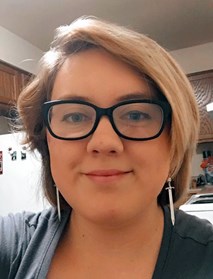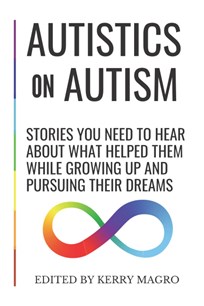Alexia Wilson
“The phrase ‘grow up’ doesn’t really have a real meaning. The ideas of growing up don’t seem fun to me either. I’m all about making sure life is worth living… I want an adventure. I want a job worth living for. Most of all, I want to be a writer so I can show others that growing up is whatever you decide it means.”
- Alexia Wilson, “Despite the Abuse and Bullying I Suffered Growing Up with Autism, I’m Now Going to College!”
College is a place of great opportunity, not just in academic and professional advancement, but in personal growth and self-discovery as well. USI student, Alexia Wilson, has wasted no time in seizing all these opportunities. Alexia has had immense academic and professional success, as she recently had her essay “Despite the Abuse and Bullying I Suffered Growing Up with Autism, I’m Now Going to College!” published in a collection called Autistics on Autism: Stories You Need to Hear About What Helped Them While Growing Up and Pursuing Their Dreams, edited by Kerry Margo. This collection, as well as her essay, was released for sale on Amazon on March 29, 2022. Since the collection’s release, it is now in listed as a “Best Seller” in its genre on Amazon. Furthermore, all proceeds go to KFM Making a Difference, a non-profit  organization founded by Kerry Magro that helps provide scholarships for adults with autism to attend college.
organization founded by Kerry Magro that helps provide scholarships for adults with autism to attend college.
Alexia explains how, although publishing her work has always been a dream of hers, she did not expect her essay “Despite the Abuse and Bullying I Suffered Growing Up with Autism, I’m Now Going to College!” to be the first piece she published. Alexia originally wrote her essay as a part of her application for the KFM Making a Difference scholarship and, even though she was not chosen as a recipient of the scholarship, she was contacted by Kerry Magro to see if she would be interested in publication. She describes the publication process as quick and painless, involving just a few emails and a free early release copy of the collection.
Although publication is a mark of great academic and professional success, Alexia’s inspiration for writing the essay derives from the self-discovery and liberating sense of independence she has found while attending USI. In her essay, Alexia recalls how when she was younger, she “was pushed into the sides of lockers and walls, called a SPED (which is worse than ‘retard’), called fugly, and [her] homework was stolen the few times that [she] finished it.” Now, in college, Alexia believes that she has found a more accepting and less judgmental community. She describes college as one of the greatest experiences of her life.
independence she has found while attending USI. In her essay, Alexia recalls how when she was younger, she “was pushed into the sides of lockers and walls, called a SPED (which is worse than ‘retard’), called fugly, and [her] homework was stolen the few times that [she] finished it.” Now, in college, Alexia believes that she has found a more accepting and less judgmental community. She describes college as one of the greatest experiences of her life.
However, despite Alexia’s passion for writing, for the first two years of her college career her major was undecided because she wanted to choose a major that would please her family. In the end, Alexia’s newfound freedom and independence pushed her to pursue her passion for writing and editing, and she declared a major in English with an emphasis on Professional Writing and Rhetoric. Also, on her path of self-discovery in college, Alexia researched more about autism, discovered what it was, and found her identity in it. While some may prefer to be referenced as “a person with autism,” Alexia prefers the term “autistic,” although she does not like being categorized on the autism spectrum. She explains how certain medical groups will deny care if someone is classified as too high or low functioning on the autism spectrum. Alexia remembers that during her freshman year at USI, her insurance denied covering her medication because she was considered too “high functioning” to need it.
Among the issues Alexia believes there are with the social perceptions of autism in relation to the autism spectrum, inaccurate stereotypes are one of the most harmful. Alexia explains how “Autism is not easy and the hardest part to deal with is the way society treats us.” Some of the stereotypes Alexia tackles are the victimization of parents, the innocence of autistic people, and the assumption of physical indicators. She details how the majority of the support and sympathy given to those with autism goes towards the parents. Alexia wants to make it clear that parents of autistic children are not victims but just normal parents who have normal parental responsibilities towards their children. Moreover, another harmful stereotype Alexia wishes to debunk is that all autistic people are completely naïve, innocent, and dependent on others. She asserts that autistic individuals are just as capable and mature as neurotypical individuals (those without autism). Lastly, a lot of people assume that you can tell someone is autistic by the way they look but that is not the case. Alexia states that “There is no look to [autism], that’s not how it works.” She believes that is unfair to say someone is or is not autistic based on the way they look. Overall, it is always better to ask questions rather than make assumptions about other people.
Click here to purchase the collection.
Click here to learn more about the KFM Making a Difference Foundation.
Interview conducted and written by Aubrey Swart '22
Additional Student Highlights
|
Alice Wickliffe '24 |
Anna Ardelean '22 Political Science |
Stephanie Draper-Moore '20 Professional Studies |
Brandon Carrington '20 English (Creative Writing) |
|
Stephanie Folz '23 |
Kasey Hunt-Short '24 Political Science |
Kassandra Santos '21 Communication Studies |
Larissa Sobczak '23 Global Studies and Sociology |
|
Alleigh Dillman '22 |
USI Choir Trip - May 2019 Carnegie Hall, New York City |
Jada Hampton '20 Performing Arts |
|
|
Gabrielle Wy '19 |
Riley Cornett '19 Communication Studies |
Alizia True '19 |